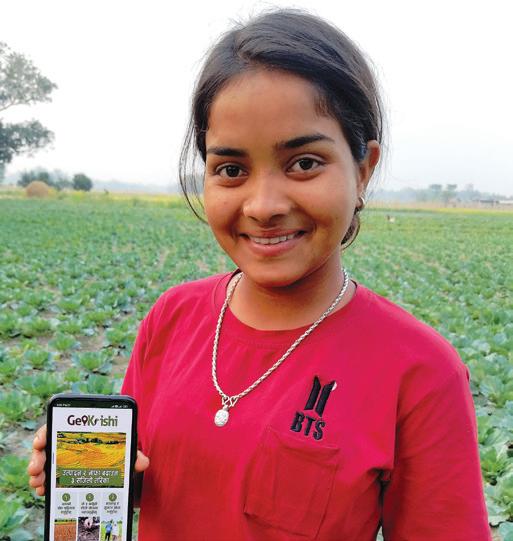
7 minute read
Making Mobile a Miracle
Pushpa Paswan is 19, and comes from a Dalit family in Nepal. Your ALWS support is helping end discrimination plus introducing mobile technology to improve farm businesses.
Framers like Pushpa can now use a mobile agricultural app called Geo-Krishi. Pushpa saw the value when she discovered a white sheath on the leaves of the family crop.
Advertisement
“I quickly took the photographs of the crops and reported online through the Geo-Krishi app. Within a few minutes I received advice from the system about the way forward and remedies. I did accordingly, and now I can see lots of growing vegetables in our farm.”
Pushpa says the Geo-Krishi App minimises the financial expenditure of low-income family, like hers. She also uses the app to track the market price of crops, and plans the crop harvesting that will provide maximise profit.
Pushpa dreams of becoming a successful agricultural entrepreneur in the future, and is very happy to share her knowledge and skills to the community members through the use of Geo-Krishi mobile app.
“Now the Geo-Krishi app, which we are using, is being a miracle for my family.”
In 2022, ALWS continued the work being done on Gender Equality since 2018 – entering Phase II of the DFAT funded Gender Context Analysis Project, while also commissioning an evaluation of Phase I. We also ran a series of 6 live workshops for partners from 9 countries to work through principles of Gender Responsive Programming – topics were about incorporating gender considerations all throughout the program management cycle.
Internally, ALWS is developing a Gender Equality, Disability and Social Inclusion (GEDSI) Strategy to increase impact and effectiveness in these critical cross-cutting issues.
Indonesia (CDRM&CDS)
What Resilient and Inclusive Community Development (RICD)
Local Partner Centre for Disaster Risk Management and Community Development Studies (CDRM&CDS)
Where North and West Sumatra and Riau Islands Province
Who 9,565 (5,353 female, 4,212 male, including 967 persons with disability) in partnership with ELCA
ALWS Action ALWS: $163,277
DFAT: $281,793
Total: $445,070
(also ELCA funding of $229,735)
Why our help is needed
Local communities report that changing climate is increasing the physical, economic and social impact of disasters. Vulnerable groups, including women and girls and people with disabilities, are particularly at risk.
Our action together in 2022
• 101 vulnerable families with increased capacity to engage in village development and advocacy
• 317 vulnerable families establish home gardens to improve food security and reduce malnutrition
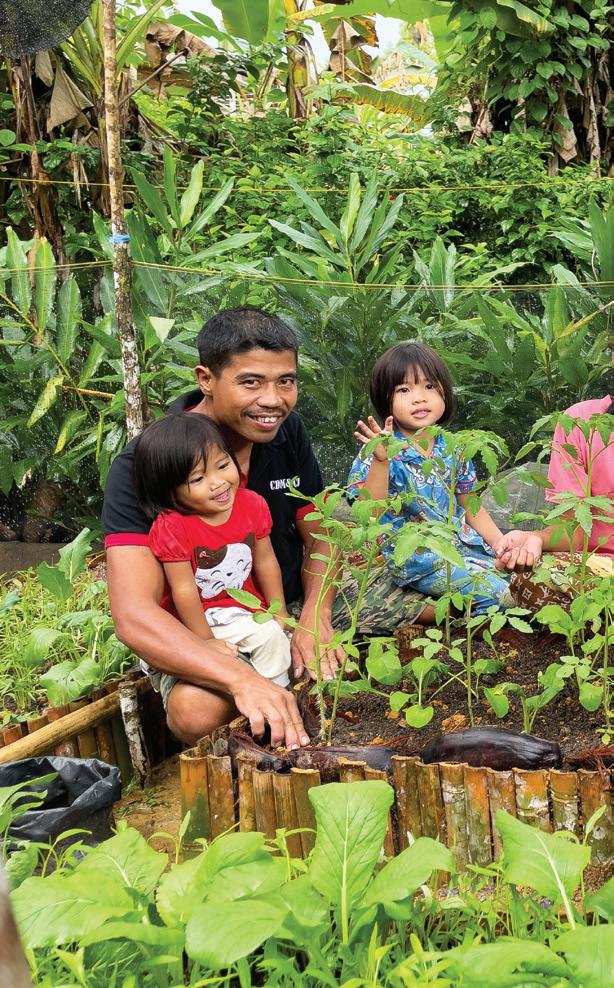
• 292 families trained in finance and saving
• 48 farmers trained to scale up banana production
• 6 demonstration plots operated by 146 farmers practicing climate change adaptation
• 785 people in 21 schools educated on disaster risk reduction and climate change
• 13 community health posts strengthened
• 24 villages with raised awareness of rights of people with disabilities and disability inclusion
• 627 women sensitised on women’s rights.
What we’re learning
Reducing barriers and providing equal opportunities can support vulnerable groups to fully participate in the development process. Gender and disability justice must be promoted at both family and community levels.
Our impact
Women and persons with disabilities, through active community-based groups, have been engaged in livelihoods, disaster risk reduction, climate change adaptation and other development processes, including voicing their rights to local authorities.
Seeds of success
“Before your support, we struggled to feed the family. If we wanted to have food and vegetables we would have to buy from the market, but we didn’t have enough money. We ate just rice.
I was often thinking ‘how can I feed the family? We needed to work for other families like slaves on their rubber trees just to survive.
The first support we got was with chickens and piglets. From selling the eggs and the piglets that we bred, we could buy clothes and vegetables for the children.
I joined the Farmer’s Group set up CDRM&CDS (your ALWS partner in Indonesia) to learn about growing my own kitchen garden. I learnt how to prepare the land by digging and making the compost. I would collect soil from the land and leaves and other plants to make a mulch. Mix it with rice husks and banana leaves too.
They taught me how to make organic fertilizer by using the water from when I wash the rice each day and to mix it with bamboo root and some other local plants. They also showed me how to make raised seed beds and even how to collect the good seeds from what I grow so I can plant and not have to buy from other places.
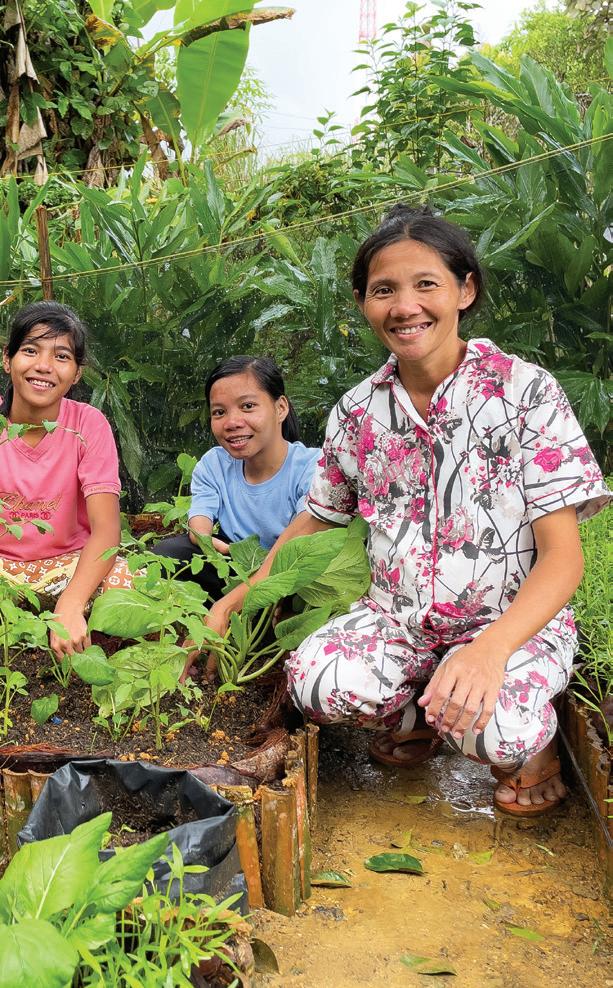
I grow chillies, beans, mustard leaves, corn, eggplant, tomatoes and kangkun - my favourite! The children get nutrition from the vegetables. Now I don’t need to go and buy, especially when we have not much money.
I can have money for sending the children to school, especially Omera in the senior school.”
Keeping her spirit
“When Omera was born, the midwife did not bring my baby to me.
They kept her for two days because she was not normal like other babies. Her hands were not normal.
But when I saw Omera, I was not sad. I saw her beautiful face, and this changed my heart. I loved her.
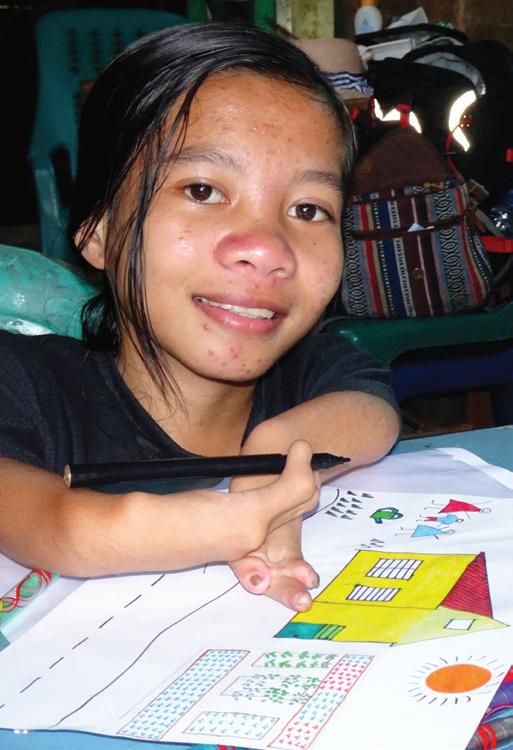
When Omera came home from the hospital, many people from the village came to see. They told me many hard things like, “how can you take care of this baby? Look at her hands and feet! What can this baby do when she grows up? You will have trouble in the future.”
Sometimes I would think about those words, and I would cry. But I was not influenced by these words. When I felt sad, I would tell myself that Omera is a gift from God and that each gift He gives can be different.
I thank the people of Australia for helping my family to make the garden, and especially for Omera so she can keep her spirit in education and keep learning and feel confident in herself.”
Papua New Guinea
What Church Partnership Program
Local Partner Evangelical Lutheran Church of PNG (ELCPNG)
Where Country-wide
Who 2,848 direct participants
(1,165 female, 1,683 male, including 122 with disabilities)
ALWS Action ALWS: $1,632
DFAT: $471,728
Total: $473,360
Why our help is needed
Families and communities in PNG, especially in remote rural areas, face many health, education, livelihoods and security challenges, yet adequate service delivery is lacking, and women, children and persons with disabilities are particularly at risk.
Our action together in 2022
• 418 people trained on disability-inclusive development and establishing self help groups
• 25 young people (18 male, 7 female) trained in peer counselling skills to help reduce violence in schools
• 34 young people join character-building workshops t0 develop leadership skills
• 71 coffee farmers equipped to use solar dryers to improve coffee production
• 63 farmers trained to produce pig feed from self-grown sweet potato tubers and leaves
• 136 people trained on disaster risk management
What we’re learning
Good plans and flexibility are needed to adapt to changing contexts and opportunities. Training young people is helping make progress on difficult challenges like violence.
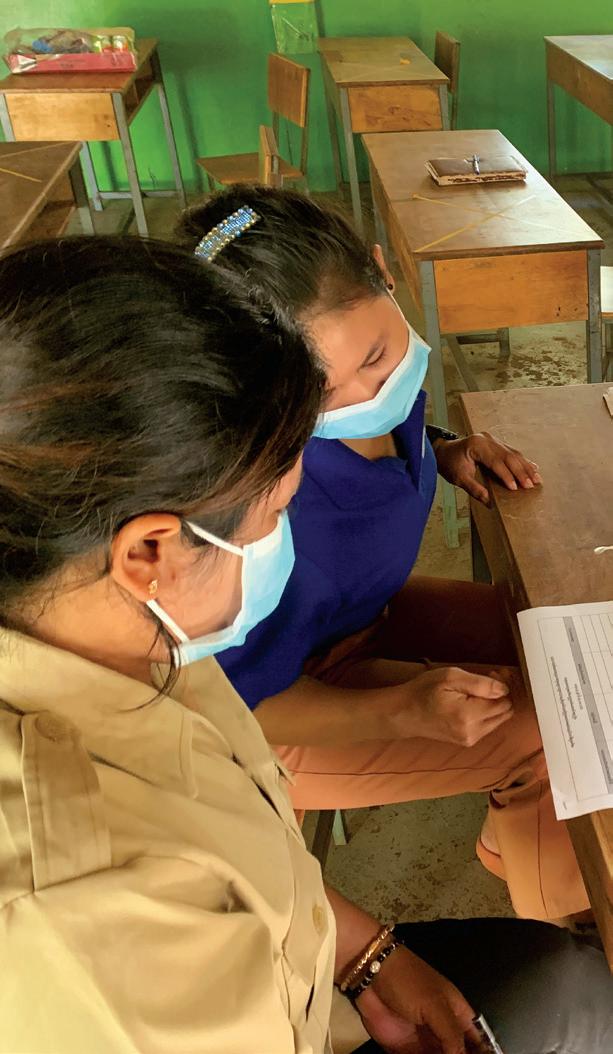
Our impact
Through the Church Partnership Program, the ELCPNG is increasing the wellbeing of families and communities through improving its health and education services, engaging young people in development activities, supporting vulnerable people, and assisting communities to build up their resilience in the face of disasters, climate change and conflict.
Drop-out to Chief
“My family are farmers, and have a low income. Because we were poor, I decided to drop school to help the family do the rice field and join with community volunteers.”
Mr Sim Sau is now 34 years old, and married with two children. When he was 26, his work volunteering in the community led to him being elected as a Deputy Village Chief.
“At that time, I could not write letters or undertake problem-solving. I always sought support from my supervisor, a village chief, and it was really difficult when he was absent.
“Due to my young age, I did not dare to speak within the meeting because of fear. Yet in 2019, villagers voted me to be a village chief. I was very surprised and excited about this position, but had no skill to facilitate the meeting, did not understand village development or how to make a development plan, so always had to for help.”
That’s when your ALWS support enable Mr Sau to receive training from ALWS partner, Life With Dignity.
“I received training on development concept, rights-based approach, social accountability, disaster risk reduction, husbandry, and community management. This makes me more confident of my role, and gives me the ability to perform better as I work to support my community members to live with dignity.
Cambodia
What Holistic Rural Development Program
Local Partner Life With Dignity
Where Pursat, Battambang, Kampong Chhnang, Kampong Speu, and Svay Rieng Provinces
Who 31,329 people (15,940 female and 15,389 male, including 401 persons with disabilities) in partnership with other agencies
ALWS Action ALWS: $350,000
Why our help is needed
Rural communities in Cambodia face many challenges and need support to develop their livelihoods and increase their resilience in the face of disaster risks and climate change.
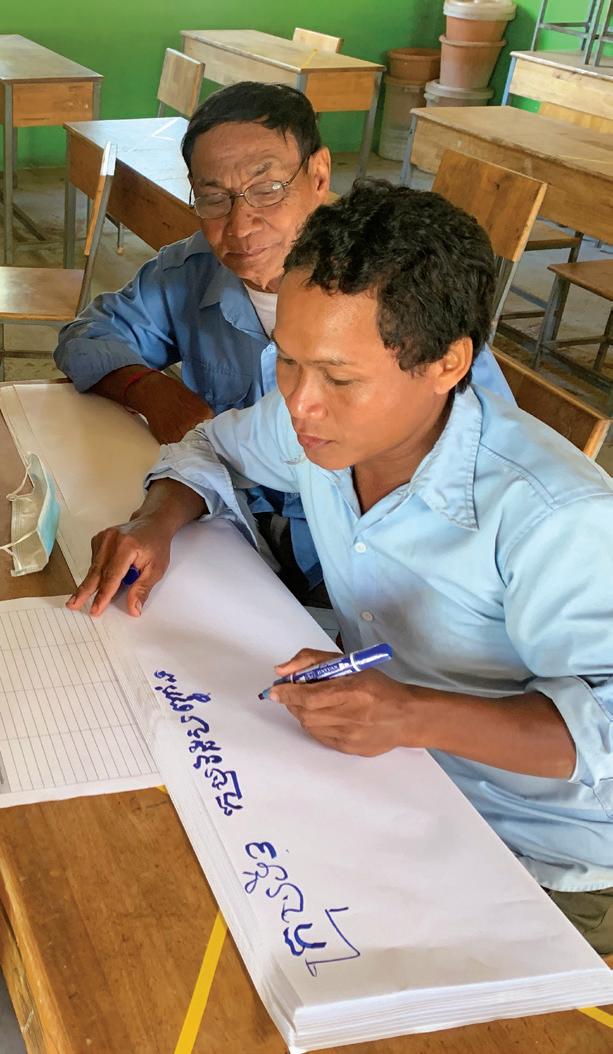
Our action together in 2022
• 2,178 community members, 155 young people, and 2,685 school children received support to strengthen their capacity to reduce disaster risks and adapt to climate change
• 203 members of provincial, district and commune disaster management committees with strengthened capacity for disaster risk reduction and climate change adaptation
• disaster risk reduction and climate change adaptation plans developed in 10 communes and 41 schools
• 7,755 community members benefitted from 14 small-scale infrastructure projects (construction or renovation of 6 village roads, 2 canals, 3 spillways, 2 water gates, and 1 water supply system)
• 24 transparency and accountability assessments conducted assessing public services provided by commune councils, schools and health centres.
What we’re learning
Preparing and supporting smallholder farmers to be trainers or focal persons in each village was effective for coaching other farmers. The cross-learning has help build up technical knowledge and skills including building resilience to climate change.
Our impact
Vulnerable communities are building their resilience and wellbeing by identifying and reducing risks from disasters and climate change, improving their village roads and irrigation systems, and engaging with government for improved delivery of health, education and other services.





